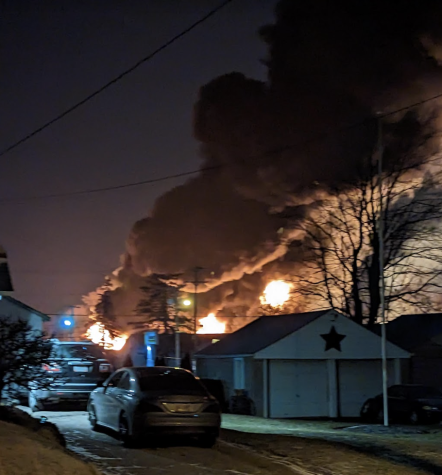Train derailment shows inadequacy of environmental protections
Could our relatively snowless winter be the harbinger of far more devastating consequences for our environmental recklessness
February 23, 2023
My snowshoes lean expectantly by the doorway of my dorm room, where they have remained since I moved back in this winter, and most likely will remain until I give up any hope of real snowfall some time in early April. While we have certainly had our share of typical New England weather this season, winter seems to feel more like a one-night stand than any lasting relationship, as 50 degree days clear up a weekend’s worth of snow in a few hours. On reflection, however, and in the shadow of some rather serious recent events, this rather personal letdown brings to light some more substantial global concerns.
If you have spent any time on social media these last few weeks, I am sure you’re aware of the train derailment in East Palestine, Ohio, which has left global audiences begging for answers from the government and corporations alike. I will spare you the details of exactly what occurred in East Palestine, as these facts can be researched with a quick google search and entire TikTok profiles have sprung up around the issue providing a wealth of knowledge which I could not contend with. In short, a train carrying several tankers with various hazardous chemicals derailed, spilling their contents into the soil, water, and air of the eastern Ohio region.
While this is an environmental tragedy, and certainly a massive disruption of daily life for those living in the area who had to be evacuated, accidents do indeed happen. No matter how many policies, safety measures, and regulations are in place, machinery will inevitably fail and consequences will ensue. That being said, my defense of Norfolk Southern, which is the operating company of the derailed locomotive, the Ohioan government, and the Environmental Protection Agency ends there.
While accidents do indeed happen, from research, and quite frankly sheer common sense, a mistake of this scale should never have happened. On the part of Norfolk Southern, rail workers have pointed out that train lengths have been increasing to match the demand of corporate shareholders, resulting in rail workers having to contend with many more variables in the event of a minor mechanical hiccup, minor hiccups which could lead to more serious problems when these variables are compounded.
Meanwhile, the state government of Ohio has seemingly been treating this as a run-of-the-mill railroad accident, and not the horrifying environmental tragedy that it is. In a first-world country, we should not be burning off toxic chemicals to get rid of them, nor should we be reliant on the word of a corporation for the best strategies to cover up their mistake. In the first hours and days after this incident, the government simply yielded power to Norfolk Southern and did their bidding. Of course, rail companies should be trusted with the knowledge of how to handle railroad accidents, but under no circumstances should we blindly trust a corporation with cleaning up the mess it just made, and it seems that this is what the governor’s office did.
On that note, the EPA has handed down an edict which will force Norfolk Southern to handle the clean-up of all remaining chemicals in the area surrounding the derailment, or face paying the EPA triple the cost of the clean-up if they refuse. Again, we are trusting a corporation to clean up after itself as if it were a child, and having all been former children, we certainly know that cleaning up is not a strength at that time. Norfolk Southern is far more likely to shove the chemical fallout under their proverbial bed than actually deal with the problem, and when the mess under the bed is actually in the water, soil, and air of an American community, that is a major problem.
That leaves just a few options, then. The first is that our government genuinely trusts a corporation enough to manage the aftermath of a once in a lifetime environmental disaster, which is utterly ridiculous and is a blatant display of incompetence. Second, the government doesn’t have the teeth to actually enforce any of its regulations against the might of corporate America and must simply bend to the will of the very corporations that desecrate our environment. Or finally, the government is in bed with the corporations, and is simply helping to undermine taxpayers and consumers alike. All such outcomes turn my stomach.
But the crisis in East Palestine is just a one-off accident, right? Wrong. It is exemplary of the government’s inability to handle much larger socio-environmental concerns like climate change and ecological preservation. If our leaders must turn to corporations to further mishandle a few tipped-over train cars, then who will our government turn to when we no longer have any winter to speak of? We must have clear, and harsh, guidelines for environmental disasters such as the one in eastern Ohio, so that we can chip away at the generational issues which threaten our very existence.
So what does this mean for the future? Firstly, we need to dramatically rethink our leadership in America. We can no longer allow ourselves to be controlled by corporations which are so willing to destroy the planet to make a quick buck. Corporate greed leads to pollution of both the mind and the environment. This does not mean swapping one corrupted party for another each election cycle, however. This means eliminating corporate money from elections, limiting the role of corporate lobbyists, and shutting the revolving door of bureaucracy. Ultimately, this means returning the power of our government to living, breathing people who are capable of making decisions for the common good, not for the benefit of a few.
Second, we must begin to reduce our footprint on the environment. This means curbing our reliance on plastics and non-natural materials in our daily lives. Of course it would be unreasonable to expect Americans to give up their disposable anything overnight, but we must start somewhere. Cutting back on pollution will at least buy us more time to accomplish the next step.
Third, we can begin to reshape the world to benefit those who inhabit it; not only must we make the planet safe for human habitation, but we must also make every effort to allow the natural world to thrive. This would entail not merely cutting back on pollution, but actually reversing it. While the world may seem too far gone at this point, I have full confidence in the ability of the human spirit to achieve great things in the face of adversity. We must strive for a solution to the generational accumulation of pollutants in the natural world.
Fourth, and finally, these concepts must be enshrined in both daily life and legal documentation. We need stricter environmental regulations to preserve our planet and punish those who wish to do it harm. As we have seen, however, regulations will always fall short, either at the hands of slimy lawyers searching for loopholes or greedy scofflaws who are only in it for themselves. Therefore, it is up to us to hold others accountable for their impact on the environment. The only real safeguard against the corporate destruction of America, short of open rebellion, is advocacy. We must advocate for ourselves, for our neighbors, for our communities, and above all, for the fragile, damp space rock we all call home, planet Earth.
If any future political candidates want the support of this environmentally-conscious voter, they should be baying for Norfolk Southern’s blood right now, preferably in the form of a check.




